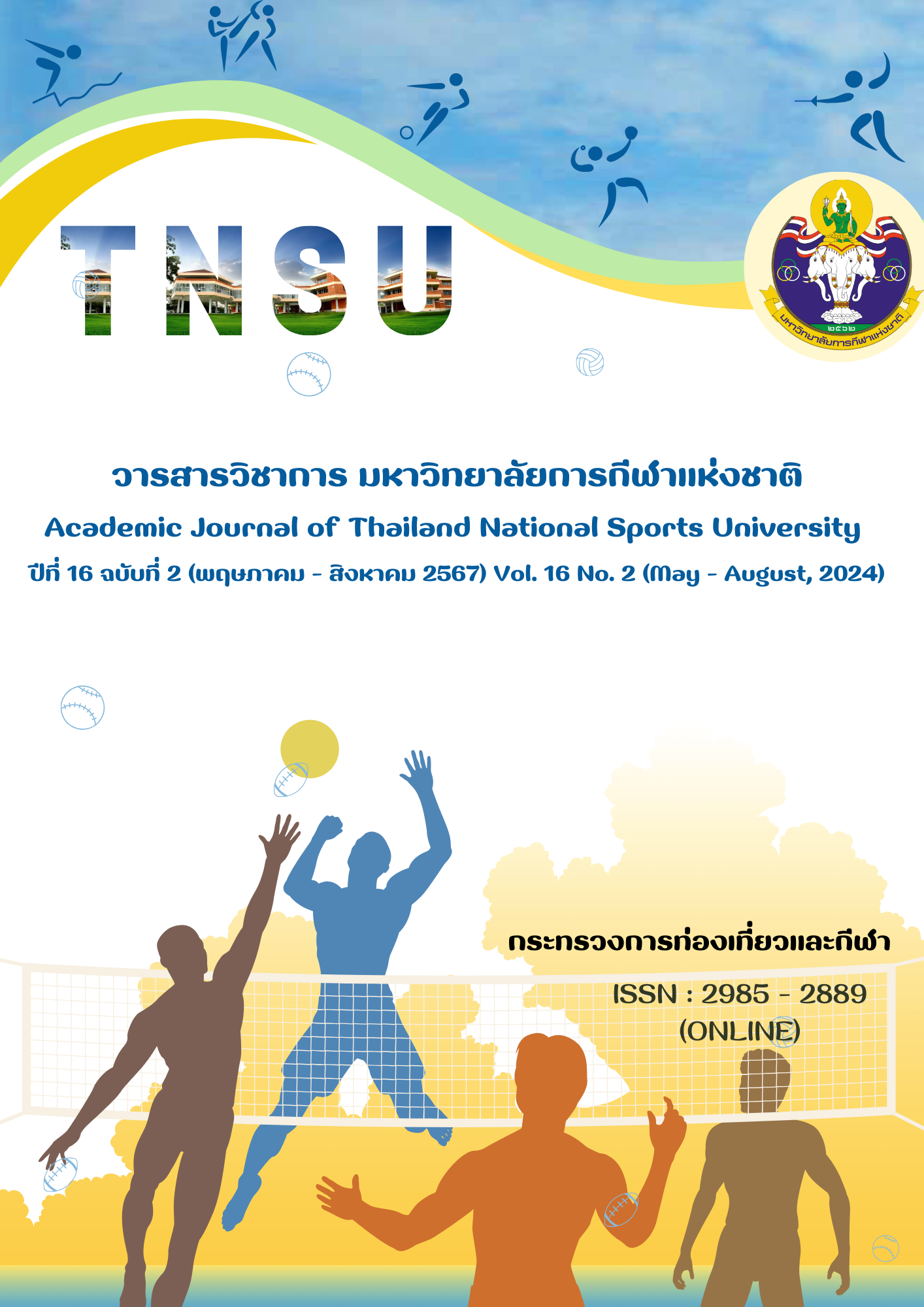THE EFFECTS OF COMPLEX TRAINING ON BREASTSTROKE PERFORMANCE OF YOUNG SWIMMING ATHLETES
Main Article Content
Abstract
This study aimed to investigate and compare the effects of complex training on the breaststroke performance of young swimming athletes. The participants were 30 swimmers aged 12-14 years who were registered with the Phuket Swimming Association and participated in swimming training at the Phuket Swimming Club. They were pre-tested for their speed in the 25-meter breaststroke and randomly divided into two groups (n=15/each) by matching method. The control group was trained according to the club’s regular swimming program, while the experimental group was trained with a complex training program developed by the researcher along with the club’s regular swimming program. Data were analyzed using mean, standard deviation, t-test, and Bonferroni test. The results showed no significant difference in breaststroke performances between the experimental and control groups before training. However, statistically significant differences in breaststroke performance were found between the two groups after the fourth and eighth weeks of training at a significance level of .05. CONCLUSION: Complex training is a form of coaching that aims to develop an athlete's performance to improve fitness related to abilities such as strength, speed, and endurance.
Article Details

This work is licensed under a Creative Commons Attribution-NonCommercial-NoDerivatives 4.0 International License.
The published article is a copyright of the Academic Journal of Thailand National Sports University. The passage appeared in each article in this academic journal is a perspective of each author which is not related to the journal. Each author is required to be responsible for all components of his/her own article. If there are any mistakes, each author must be responsible for those mistakes on his/her own.
References
Atithep Wichan, Kajon Trisopanakorn, & Atchareeya Kasiyaphat. Effects of complex training on speed and agility of women’s handball players of Institute of Physical Education, Lampang Campus. Journal of Health, Physical Education and Recreation, 48(2), 412 - 425.
Charoen Krabuanrat. (2015). Science of coaching. Bangkok: Sintana Copy Center.
Chonlawat Phoduang, & Thepprasit Kulthawatwichai. (2020). Management guidelines of Thailand swimming championships management. Ramkhamhaeng Research Journal, 20(1), 12 – 29.
Natthida Bangmek, & Kanok Panthong. (2020). The effects of combined dry - land strength training and swimming training on composition, muscle strength and aerobic swimming performance in young swimmer: A study. Journal of Sports Science and Technology, (20)1, 36 - 54
Ronnaphop Chaoplaina, & Tossaporn Yimlamai. (2020). The effect of eccentric complex training on leg muscular performance in soccer players. Journal of sports science and health, 21(3), 327 - 341.
Rovilnelli, R. J., & Hambleton, R. K. (1976). On the use of content specialists in the assessment of criterion - referenced test item validity. San Francisco, California: American Education.
Sadowski, J., Mastalerz A., & Gromisz, W. (2020). Transfer of dry - land resistance training modalities to swimming performance. Journal of Human Kinetics, 74(1), 195 - 203.
Sports Authority of Thailand. (2018). Swimming skills enhancement. Bangkok: Sports Authority of Thailand.
Sontaya Silamat. (2017). Principles of sports training for coaches (5th ed.). Bangkok: Publishing House of Chulalongkorn University.
Thavorn Kamutsri. (2017). Enhancement of physical fitness. Bangkok: Media Press Printing House.
Thailand Swimming Association. (2018). Swimming instructor's handbook. Bangkok: Sports Authority of Thailand.
West, D. J., Owen, N. J., Cunningham, D. J., Cook, C. J., & Kilduff, L. P. (2011). Strength and power predictors of swimming starts in international sprint swimmers. The Journal of Strength & Conditioning Research, 25(4), 950 - 955.


